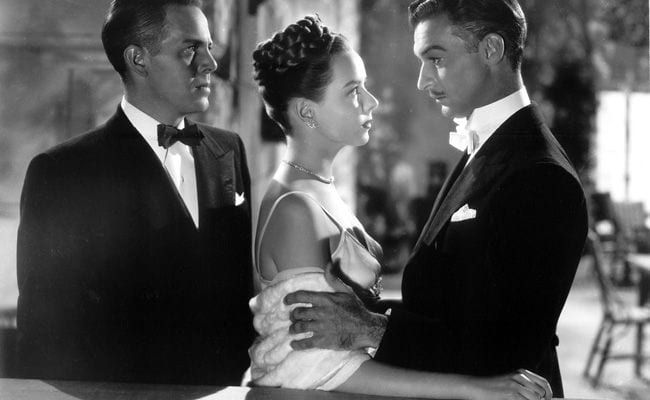
Ruthless is an Eagle-Lion production that must be the most lavish project ever directed by Edgar Ulmer, who spent most of his career working with budgets that seemed barely to include the camera. Thematically, it’s his Citizen Kane or Magnificent Amberson, here seen in a fine print showing off sinuous and ceiling-heavy photography from Bert Glennon and lavish design from Frank Sylos. Unlike the aforementioned films, Ruthless is not great; however, it’s hard to take one’s eyes off of.
It opens with a strained romantic couple, Vic Lambdin (Louis Hayward) and Mallory Flagg (Diana Lynn, the wonderful kid sister from The Miracle of Morgan’s Creek ), arriving at the fabulous mansion of millionaire Vendig (Zachary Scott, specialist in slimeballs), who’s announcing that he’s donating the property and $25 million to his peace foundation. When he realizes that Mallory is the spitting image of a girl he used to know, it triggers the flashback that occupies the first half of the movie (with Lynn in a dual role), back to his boyhood with a bitter mother and divorced low-class waterfront father (Raymond Burr!) and how he began his upward climb, discarding fiancées like outworn wooden legs.
The second half is another flashback, centering on the expansive Sidney Greenstreet as a tycoon monopolist married to a trophy wife (Lucille Bremer, Arthur Freed’s discovery for Yolanda and the Thief), and the plot turns on very technical points about shares and interests, as embodied by these personalities. The film delivers a point that is well known by the world of the present day: successful ruthless men (and, by extension, capitalism) are driven by jealous emptiness that leaves them unsatisfied and must lead to downfall. It’s overall a bit turgid, yet highly watchable. The ending crosses into an absurd bit of action and concludes with Mallory pronouncing the epitaph: “He wasn’t a man. He was a way of life.”
The lush, romantic score uses a female abstract vocal at certain points, especially in scenes at Greenstreet’s mansion and again at the end, implying the siren that motivates him. The score was handled by prestigious American composer-conductor Werner Janssen with his Janssen Symphony Orchestra, major commissioners of contemporary music through the 1940s. The Academy liked to keep nominating him for Oscars for his scores to basically minor movies, including another Zachary Scott title, Jean Renoir‘s The Southerner. They forgot to nominate him for this one, though.


![Call for Papers: All Things Reconsidered [MUSIC] May-August 2024](https://www.popmatters.com/wp-content/uploads/2024/04/all-things-reconsidered-call-music-may-2024-720x380.jpg)



